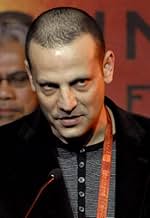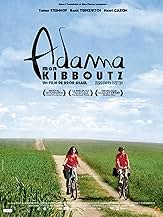Set in mid-70's, 12-year old Dvir Avni navigates between the equality values of his home-born Kibbutz and the relationship with his undermined mother, whom the Kibbutz members will to denoun... Read allSet in mid-70's, 12-year old Dvir Avni navigates between the equality values of his home-born Kibbutz and the relationship with his undermined mother, whom the Kibbutz members will to denounce.Set in mid-70's, 12-year old Dvir Avni navigates between the equality values of his home-born Kibbutz and the relationship with his undermined mother, whom the Kibbutz members will to denounce.
- Awards
- 9 wins & 7 nominations total
- Director
- Writer
- All cast & crew
- Production, box office & more at IMDbPro
Featured reviews
I saw this movie, just now, not when it was released and hailed as best picture of the year here in Israel. and to summarize everything right now, I will just say: this is not a good film.
This is Dror Shaul's second feature film, and I have to admit that his first and the TV drama he made before this picture are much better. further more, this is his first attempt at directing a drama. the early works were comedies, and were funny and effective.
The first thing you have to know if you'll ever see this film: Israel of the 21st century hates the kibbutz and the values it represented since the formation of the state of Israel. the real situation of the kibbutzim is very dire, and some of them disappear one by one. the kibbutz, Hebrew word for collective, was a sort of village for members only, where the values of equality and socialism were the dogma for everyday life. with the change in social values with time, it seems now that the kibbutz was a place where the human spirit was repressed, locked within the dogma rules, with no ticket out. the entrance of capitalist values and way of life in the 90's and so far made it very hard on the kibbutzim to survive. the crazy mother in the film is the central metaphor for that.
But, I regard this film as having nothing to do with nostalgia for the good old days of the kibbutz. once, it was a dream of every young couple to live in a kibbutz and raise children in this quite and beautiful environment. but the film shows the opposite. that the kibbutz, with it's socialist dogma, was a place sort of like a cult of crazy people, with crazy ideas that undermine the freedom of each individual within the collective. this is the central philosophy of post modern capitalism: your individuality is the most important thing. you must place yourself in the center, and no one else but you is the matter. this is the philosophy the film stands for, and that's just it's first sin.
If you disagree with me on the political side, I'm sure you will agree that the acting, the tone of the film, it's script and it's direction are the four sins that follow. the film has no real visual text and none of it's shots is something to remember. it is also very "delicate", a delicacy that is no more than artsy fartsy attempt to provoke emotions, which do not surface, not in the film and not with the viewer. it brings nothing but boredom.
Can someone please explain: why this film won so many prizes? maybe because it shows that Israel is in line with the rest of the world, hating socialist and human values? or maybe it shows that Israel is a "delicate" place, not giving in to dogmas and fanaticism? that we are basically very human and good people, capable of emotions, especially when they are fake ones, just like capitalism expects us to be? or maybe because it tells one of the biggest lies of Israeli cinema in recent years, a lie that undermines the justification of the existence of the Jewish state? no matter what the answer is, it's not a good one. not for the world, not for human values and not for the Jews.
This is Dror Shaul's second feature film, and I have to admit that his first and the TV drama he made before this picture are much better. further more, this is his first attempt at directing a drama. the early works were comedies, and were funny and effective.
The first thing you have to know if you'll ever see this film: Israel of the 21st century hates the kibbutz and the values it represented since the formation of the state of Israel. the real situation of the kibbutzim is very dire, and some of them disappear one by one. the kibbutz, Hebrew word for collective, was a sort of village for members only, where the values of equality and socialism were the dogma for everyday life. with the change in social values with time, it seems now that the kibbutz was a place where the human spirit was repressed, locked within the dogma rules, with no ticket out. the entrance of capitalist values and way of life in the 90's and so far made it very hard on the kibbutzim to survive. the crazy mother in the film is the central metaphor for that.
But, I regard this film as having nothing to do with nostalgia for the good old days of the kibbutz. once, it was a dream of every young couple to live in a kibbutz and raise children in this quite and beautiful environment. but the film shows the opposite. that the kibbutz, with it's socialist dogma, was a place sort of like a cult of crazy people, with crazy ideas that undermine the freedom of each individual within the collective. this is the central philosophy of post modern capitalism: your individuality is the most important thing. you must place yourself in the center, and no one else but you is the matter. this is the philosophy the film stands for, and that's just it's first sin.
If you disagree with me on the political side, I'm sure you will agree that the acting, the tone of the film, it's script and it's direction are the four sins that follow. the film has no real visual text and none of it's shots is something to remember. it is also very "delicate", a delicacy that is no more than artsy fartsy attempt to provoke emotions, which do not surface, not in the film and not with the viewer. it brings nothing but boredom.
Can someone please explain: why this film won so many prizes? maybe because it shows that Israel is in line with the rest of the world, hating socialist and human values? or maybe it shows that Israel is a "delicate" place, not giving in to dogmas and fanaticism? that we are basically very human and good people, capable of emotions, especially when they are fake ones, just like capitalism expects us to be? or maybe because it tells one of the biggest lies of Israeli cinema in recent years, a lie that undermines the justification of the existence of the Jewish state? no matter what the answer is, it's not a good one. not for the world, not for human values and not for the Jews.
In the center of "Sweet Mud" ("Adama Meshuga'at" in Hebrew) we find the story of Miri Avni (Ronit Yudkevitz) and her growing up son, Dvir (Tomer Steinhof, with a stunning debut), in a southern Kibbutz during the 1970's.
Where people have to struggle to give from themselves for each other, Miri is constantly trying to recover from the mysterious death of her husband. Under these circumstances, Miri's sensitive situation is worsened and stands contrary to the values of equality that rule the Kibbutz, through the eyes of its members.
Dvir, who's at his Bar-Mitzva's year, is familiar with his mom's condition and tries to prevent her from losing her mind and kick her back to float with the stream. This purpose becomes even more complicated when Dvir has to deal the contrast between the Kibbutz's equality values and his mother's liberty and freedom to live as mentally-ill person at the normative society, and is about to change his adolescence and life.
This flick was mastered and crafted by an accurate and sensitive direction, powerful performances, trembling soundtrack and phenomenal cinematography, and it's well driven by its refined storyline.
Dror Shaul portrayed a personal, yet very resolute story of life in the Kibbutz before privatization, alongside a strict, emotionally-precise coming-of-age tale for independence and dignity.
Young actor Tomer Steinhof is the basis of this film. His performance is so minimalistic, so moving and so convincing that he just tears apart the viewers hearts. This kid HAS to win world-wide recognition and must appear on as many films as possible. Beautiful Ronit Yudkevitz is another supporting-pillar of the film, with a wretched, merciless portrait of a lapsed and helpless woman. Her physical and mental deterioration is absolutely heart-rending. The chemistry between these two marvelous actors and the characters they hand over to the screen is very convincing and leads to many emotional refractions.
The supporting actors do wonderful job as well; Senior Belgique actor Henri Garcin shines on a 5-minutes, yet very important role, as the foreign aging lover of Miri; Shai Avivi with a role of the "comic-moderator" though a very malice person; Gal Zaid as the controversial secretary of the Kibbutz; And many more.
Mixed with mesmerizing music and amazing cinematography, this movie turns to be one of the best Israeli films of all times, if not the best of them.
I was truly affected by this piece of culture.
Where people have to struggle to give from themselves for each other, Miri is constantly trying to recover from the mysterious death of her husband. Under these circumstances, Miri's sensitive situation is worsened and stands contrary to the values of equality that rule the Kibbutz, through the eyes of its members.
Dvir, who's at his Bar-Mitzva's year, is familiar with his mom's condition and tries to prevent her from losing her mind and kick her back to float with the stream. This purpose becomes even more complicated when Dvir has to deal the contrast between the Kibbutz's equality values and his mother's liberty and freedom to live as mentally-ill person at the normative society, and is about to change his adolescence and life.
This flick was mastered and crafted by an accurate and sensitive direction, powerful performances, trembling soundtrack and phenomenal cinematography, and it's well driven by its refined storyline.
Dror Shaul portrayed a personal, yet very resolute story of life in the Kibbutz before privatization, alongside a strict, emotionally-precise coming-of-age tale for independence and dignity.
Young actor Tomer Steinhof is the basis of this film. His performance is so minimalistic, so moving and so convincing that he just tears apart the viewers hearts. This kid HAS to win world-wide recognition and must appear on as many films as possible. Beautiful Ronit Yudkevitz is another supporting-pillar of the film, with a wretched, merciless portrait of a lapsed and helpless woman. Her physical and mental deterioration is absolutely heart-rending. The chemistry between these two marvelous actors and the characters they hand over to the screen is very convincing and leads to many emotional refractions.
The supporting actors do wonderful job as well; Senior Belgique actor Henri Garcin shines on a 5-minutes, yet very important role, as the foreign aging lover of Miri; Shai Avivi with a role of the "comic-moderator" though a very malice person; Gal Zaid as the controversial secretary of the Kibbutz; And many more.
Mixed with mesmerizing music and amazing cinematography, this movie turns to be one of the best Israeli films of all times, if not the best of them.
I was truly affected by this piece of culture.
The cinematography in this film is somewhat fantastic. For this I feel the production team really succeeded and proved that amongst other international contemporary film makers, Israel can too present a film that is aesthetically pleasing.
In the director's cut, Dror Shaul claims that the film is of 'one boys vision' of his own current affairs and that there are no political views that hide behind the surface of the film. I disagree with this statement and although I have never experienced a Kibbutz before I am able to understand that this film takes on a very one-sided stance of the system, propaganda and regime of the kibbutz. Shaul fails to balance out the film and portrays it as an obsolete institute of total corrupt. He paints the opposite of an idealistic vision over it and I feel this might cause a bit of controversy amongst previous or current kibbutz members.
The story line is emotional. It really seems as though the director, team and actors have put a lot of effort and time into producing a story which is captivating yet subjective, submitting a senseful and sensitive drama which encourages the viewer to follow and react in accordance to the actors emotions.
It is a film to watch and certainly one of the greats of upcoming contemporary Israeli cinema.
In the director's cut, Dror Shaul claims that the film is of 'one boys vision' of his own current affairs and that there are no political views that hide behind the surface of the film. I disagree with this statement and although I have never experienced a Kibbutz before I am able to understand that this film takes on a very one-sided stance of the system, propaganda and regime of the kibbutz. Shaul fails to balance out the film and portrays it as an obsolete institute of total corrupt. He paints the opposite of an idealistic vision over it and I feel this might cause a bit of controversy amongst previous or current kibbutz members.
The story line is emotional. It really seems as though the director, team and actors have put a lot of effort and time into producing a story which is captivating yet subjective, submitting a senseful and sensitive drama which encourages the viewer to follow and react in accordance to the actors emotions.
It is a film to watch and certainly one of the greats of upcoming contemporary Israeli cinema.
I think that it is unfair to say that this film is a vehicle to question the justification for a Jewish state, as the reviewer above notes. The film is a stark examination of the social and cultural pressures operating within the closed community of the kibbutz collective. No doubt, the response to the main character's illness both from the collective and from the individuals of the community receives harsh treatment here, but I fail to see this as a global condemnation of Israeli society. The main characters unraveling and her family's attempts to deal with this are very well done and the treatment is sincere and thoughtful. It's hard to believe that the story takes place as recently as 1974.Hadn't we come farther than that by then?
8Nozz
I saw this one on Netflix, and if everything mentioned in the other reviews is in the movie, then the Netflix version cuts at least one episode a bit short. Elsewhere in the movie I noticed what seemed to be an unexplained jump slightly forward in time. But there was a complete story, and it was a good one, about a boy whose kibbutz is putting him through some pro forma tests of maturity for his (secular) bar mitzva while he's being tested much more seriously by real life as his mentally unstable mother has no one else to turn to. A memorial note at the end hints that the story has a certain autobiographical connection; I don't know whether it's direct or not. As other reviews here note, we see the kibbutz through a severely dystopian lens. It would be unfortunate if the audience comes away convinced that kibbutz life was always that bad. Some people remember childhood on the kibbutz as idyllic, although it obviously wasn't that way for everyone.
By the way, I have no idea why the title in English is "Sweet Mud." The Hebrew title means "Crazy Soil."
By the way, I have no idea why the title in English is "Sweet Mud." The Hebrew title means "Crazy Soil."
Did you know
- TriviaDanielle Kitsis's debut.
Details
Box office
- Budget
- $1,500,000 (estimated)
- Gross worldwide
- $122,307
- Runtime1 hour 30 minutes
- Color
- Sound mix
- Aspect ratio
- 1.85 : 1
Contribute to this page
Suggest an edit or add missing content














